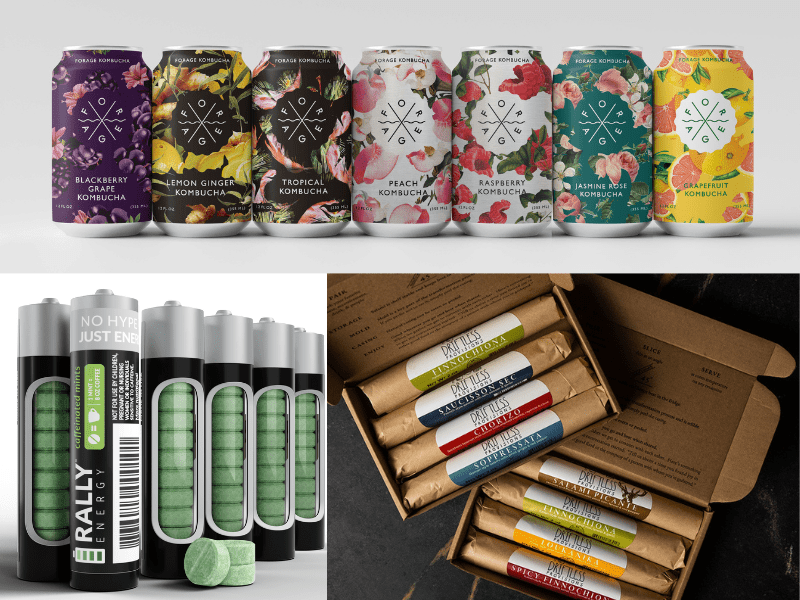The food and beverage sector is a hotbed of innovation, a big reason why investors have flocked to it in recent years. Even now, as the nation continues to weather the COVID-19 storm, there are new and interesting SKUs hitting the market every day. With consumers demanding more nutritious, natural, transparent and sustainable products, and with technological advances enabling more precise formulation, brands can score big with truly differentiated offerings.
But here’s a fun fact about food and beverage innovation: Although Nestlé, General Mills, PepsiCo and the like have deep pockets to pump into R&D, the biggest breakthroughs and category disruptions often come from scrappy upstarts. Big Food knows this, which is why many strategics now look to small independent brands to do the bulk of the innovating, before buying them up to broaden their brand portfolios. This means it’s possible for any entrepreneur with a unique recipe, novel mission or out-of-the-box idea to create a food or beverage that’s truly transformative—and profitable.
Here’s another fact about innovation in this space: It’s concentrated to certain categories. Take nutrition bars, for example. There are now a gazillion of them, with high-quality options tailored to every dietary specification under the sun. Plant-based meat alternatives is another area bursting with innovation right now. There’s a lot happening in ready-to-drink functional beverages as well.
Now, just because a category is currently rife with innovation does not mean it can’t use even more—there is always room for disruption. But it does usually mean that a category will be crowded and/or tricky for startup brands to penetrate. It’s tougher to make a real splash with a new product when there are countless other new options for consumers to choose from.
For these reasons, it may be wise for entrepreneurs to look beyond the big innovation areas to categories that haven’t changed much in recent years. Grocery stores are full of sections that feature the same brands as 10, 20 or even 50 years ago—or the same types of products, or the same basic packaging. We often take these categories for granted, thinking they’re immune to evolution or closed to innovation, when really it’s just that nobody has shaken up the status quo. There could be an untapped opportunity for the right brand and product to turn the category on its head.
This is exactly what Scout Canning is doing in canned seafood, which, talk about a tired category! It’s tuna, tuna and more tuna—just like in the 1960s—none of it particularly sustainable, traceable or trustworthy. Recognizing this, co-founders Adam Bent and Chef Charlotte Langley become compelled revitalize this stagnant space and align it with the values consumers care about today. As Adam explains in the latest Edible-Alpha® podcast, this means getting Americans eating more shelf-stable seafood by introducing them to different responsibly sourced species. In just a short time on the market, Scout Canning has succeeded at making a stodgy category sexy.
Other categories may offer similar opportunities to upend the same-old-same-old and inject new life. This could be done through unique ingredients, a new delivery format, more sustainable packaging or impactful branding, for instance. By examining and then questioning how things “have always been done” in stagnant categories, entrepreneurs may just unlock the door to game-changing innovation.
Important Updates from FFI We’re hiring a Farm Outreach Specialist in collaboration with the Wisconsin Small Business Development Center. This experienced individual will help grow and finance farm businesses across Wisconsin. Find the posting here. Applications due August 14. Calling Wisconsin businesses! Apply for the FFI FaB Wisconsin Accelerator here. This excellent nine-month program builds the capacity and capitalization of food and beverage companies, positioning them for sustainable success. Applications due August 21.
And now, our roundup of the best food and beverage finance news, events and resources from around the web…
 Business Model Insights
Business Model Insights
- How CPG brands can leverage mobile to retain consumers (Food Dive) Online grocery shopping is rising rapidly and moving to mobile, handing food brands a golden opportunity to reach a broad audience and drive sales.
- Seizing the momentum of upcycling (Food & Beverage Insider)
- SHIFT20: Challenges could mar CPG companies’ goals to make 100% of packaging reusable, recyclable or compostable by 2025 (FoodNavigator-USA)
 Raising Capital
Raising Capital
- What Startup Funding Will Look Like in a Post-Covid-19 World (Entrepreneur) Venture capital investments are predicted to drop significantly, yet certain types of startups will emerge as winners while new investment vehicles will arise.
- Will COVID-19 Make Big Meat Look Like a Bad Investment? (Civil Eats)
- 7 Tips to Getting a Bank Interested in Your Startup (Startup Professionals Musings)
 CPG/National Brands
CPG/National Brands
- How to create a detailed buyer persona (New Hope Network) If you don’t understand who your core consumer is, how can you know whether your products will resonate, which sales channels are best or where to direct marketing dollars? You won’t know. You’ll pour your time, energy and money into creating a food or beverage based on guesses.
- How food innovation has continued during the pandemic (Food Dive)
- Innovating in the digital era: the evolving role of digital media on new product launches (Nielsen Insights)
 Market Trends
Market Trends
- Category-by-category sales growth reflects retail booms and busts in 2020 (New Hope Network) SPINS data on category sales over the past six months provides insight into recent retail sales patterns. Here are some of the categories that have been winners and losers in terms of sales growth.
- Sustainably-marketed products drove more than half of all growth across CPGs in past five years (FoodNavigator-USA)
- Product transparency paramount in omnichannel retail world (Supermarket News)
 Farming and AgTech
Farming and AgTech
- ntellectual property and trademark protections for fruit-growing plants are on the rise—and so are the lawsuits (The Counter) Much of the fruit consumed today is protected by IP. Does this give powerful companies too much control over the food system or behoove the fruit industry overall?
- A few farmers get huge USDA relief payments while many struggle for pennies (The Counter)
- Where the World Resources Institute got it wrong about regenerative agriculture (AgFunder News)
 Deals/M&A
Deals/M&A
- Big-Money Investors Gear up for a Trillion-Dollar Bet on Farmland (NPR) “Farmland has become steadily more expensive, and the pool of farmers and their heirs who can afford to buy it is shrinking. Yet there’s a growing appetite for it among investors, including pension funds and wealthy individuals.”
- Vital Farms’ Blockbuster IPO Proves Wall Street Has an Appetite for Sustainable Farming (Forbes)
- Misfits Market raises $85 million Series B to send you ‘ugly’ fruits and veggies (TechCrunch)

Virtual events
- Digital Food & Beverage: Legacy and Online Brands: Strategies for Engaging the Digital Marketplace: 8/18–8/19
- Spark Change Kickoff Event: 8/26
- Virtual Restaurants: 9/9
- Food Automation and Manufacturing: 9/14–9/16
- Spark Change Mission-Driven Business Community Event: 9/16
- AgTech NEXT: 9/22–11/10
- Spark Change Modern Health Community Event: 10/7
- Produce Marketing Association Fresh Summit: 10/13–10/15
- Food & Nutrition Conference & Expo: 10/17–10/20
- Food Safety Summit: 10/19–10/22
- Spark Change Organic & Regenerative Agriculture Community Event: 10/28
- PACK EXPO Connects: 11/9–11/13
- Spark Celebration: 11/10–11/11
In-person events
- Kosherfest: 11/10–11/11 in Secaucus, NJ
- PLMA Private Label Trade Show: 11/15–11/17 in Chicago, IL
- American Food Manufacturing Summit: 11/16–11/17 in Chicago, IL

